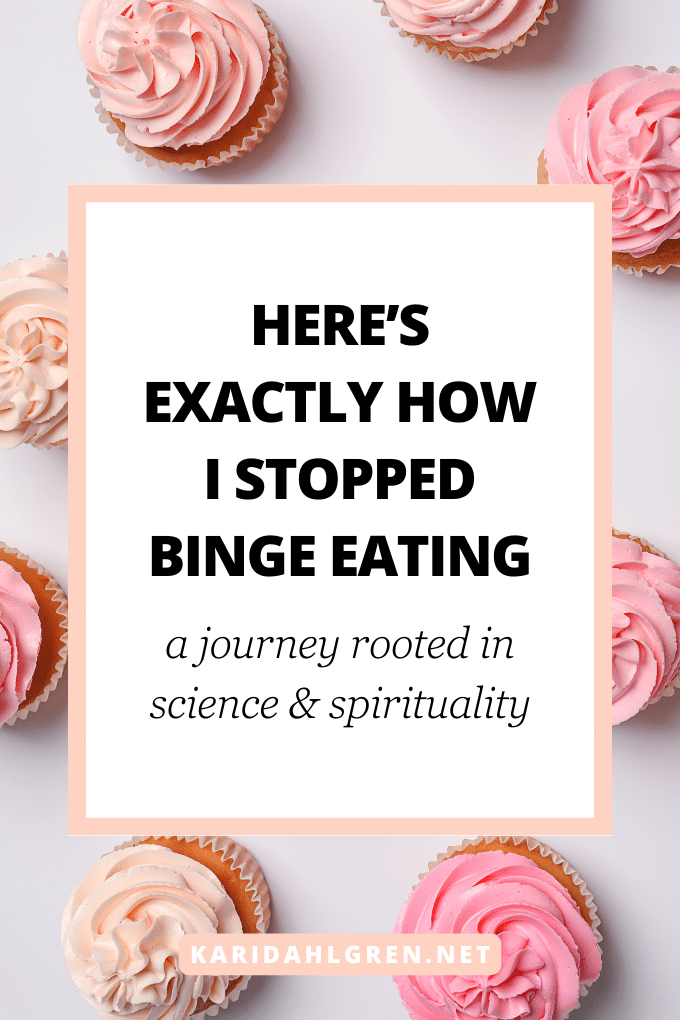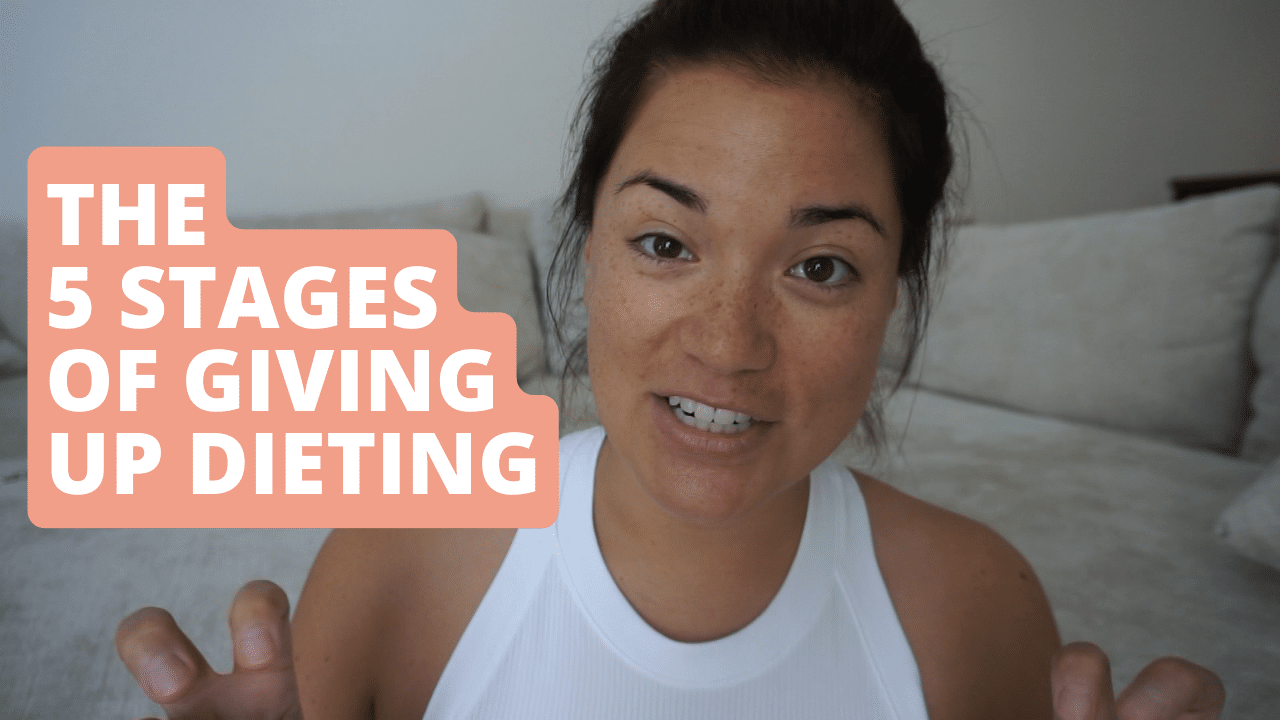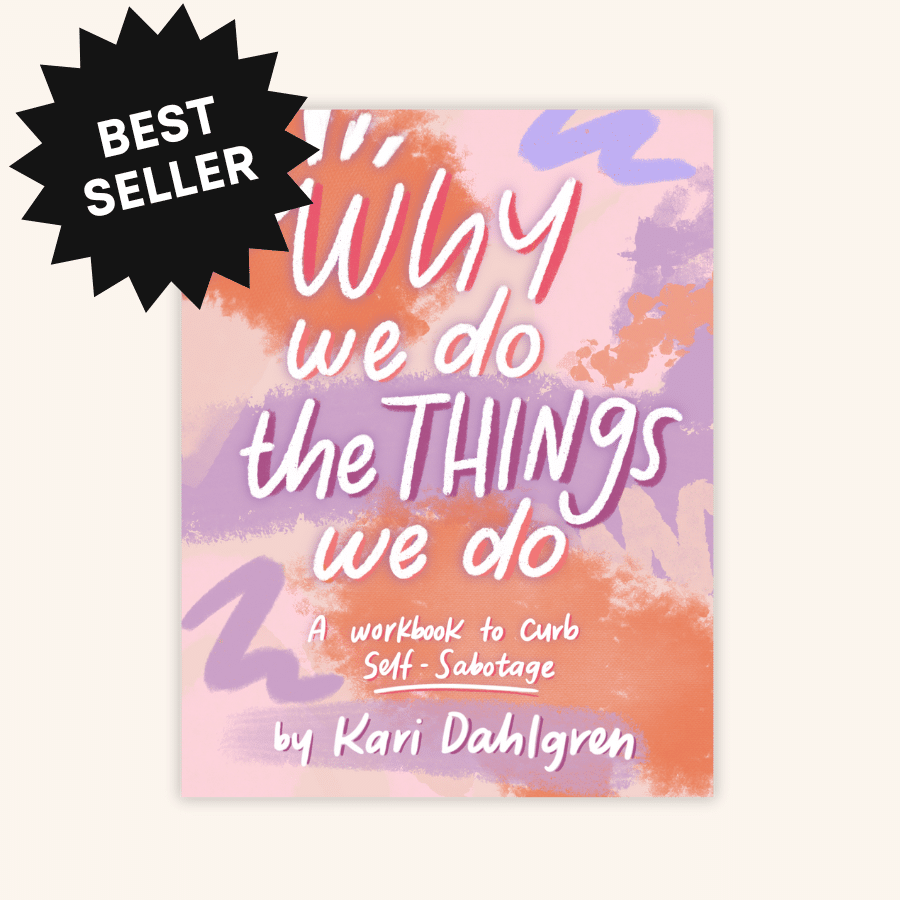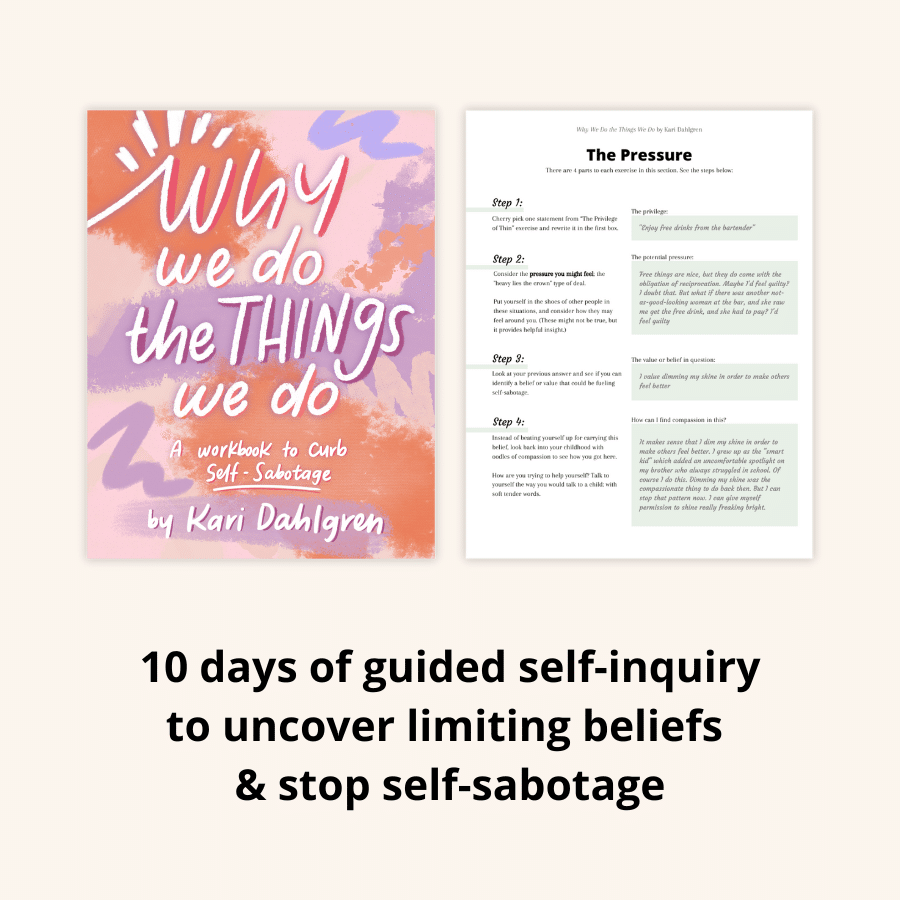
Today, I want to share the journey of how I stopped binge eating—not to prescribe a one-size-fits-all solution, but to offer a beacon of hope and a collection of strategies that might resonate with your own experiences.
As an eating psychology coach with a specialty in stopping compulsive eating, I have both personal and professional insights into the complexities of eating large amounts of food when it’s the last thing you want to be doing.
Binge eating is not just about food—that’s actually just the tip of the iceberg. For me, binge eating was the result of unaddressed emotions, habits, and responses that took years to untangle.
I want to start a conversation about these challenges, not just to share what worked for me, but to open a dialogue that might offer comfort and support to others fighting similar battles.
The Definition of Binge Eating, According to Science
The journey beyond binge eating is aided by personal stories and insights, but it must begin with a clear understanding of the clinical definition of binge eating. The term “binge eating” is commonly used to refer to eating a large amount of food, but it can also refer to a diagnosable eating disorder.
Binge Eating Disorder (BED) is a recognized medical condition that is rigorously defined by specific diagnostic criteria in the Diagnostic and Statistical Manual of Mental Disorders, Fifth Edition (DSM-5). The DSM-5 is an essential tool used by healthcare professionals to diagnose a variety of mental health conditions.
According to the DSM-5, the criteria for Binge Eating Disorder include:[1]
Recurrent episodes of binge eating, characterized by:
- Eating a significantly larger amount of food than most would under similar circumstances within a set period (e.g., any 2-hour period).
- Experiencing a lack of control over eating during these episodes.
Binge-eating episodes include three (or more) of the following behaviors:
- Eating much more rapidly than normal.
- Eating until feeling uncomfortably full.
- Eating large amounts of food when not feeling physically hungry.
- Eating alone due to embarrassment about the quantity of food consumed.
- Feeling disgusted, depressed, or very guilty afterward.
Marked distress regarding binge eating is evident.
Frequency of binge eating is at least 1 day a week for 3 months.
The binge eating is not associated with compensatory behaviors (e.g., purging, fasting, excessive exercise) and is not exclusive to other eating disorders like anorexia or bulimia.
Recognizing the signs of Binge Eating Disorder is crucial, not only for those who may be experiencing these symptoms but also for their loved ones. It’s important to approach the subject with empathy and encourage seeking help and diagnosis from qualified medical professionals.
Some of the best healthcare professionals to turn to are psychologists, psychiatrists, and registered dietitians. These healthcare professionals are qualified to diagnose and treat Binge Eating Disorder.
The National Eating Disorder Association (NEDA) also has an excellent online resource center for anyone seeking help with Binge Eating Disorder. Alongside these professional resources, I hope that the following personal story can help you identify possible solutions for navigating the journey beyond binge eating.
My Experience with Binge Eating
My personal journey with food and body image was marked by a rigorous adherence to chronic dieting. At the age of 7, I knew that I was overweight and was aware of what a “calorie” was. Once social pressures increased in high school, I became fixated on counting calories, setting a strict limit of 400 calories per meal while striving to have only 3 small meals per day.
As you can imagine, this approach seldom worked. It was unhealthy, unsustainable, and deeply unsatisfying. It led to a pattern where I found myself waking up in the middle of the night, compelled to eat snacks or chips. While these episodes might seem akin to Night Eating Syndrome or Binge Eating Disorder, it’s essential to understand the context of my eating behaviors.
During the day, I was significantly undereating, and these perceived “binge” episodes at night were often my body’s desperate attempt to reach a normal—not excessive—caloric intake. It took me a long time to realize this, and it can be difficult for others to identify as well.
When binge eating is partially defined as “eating a significantly larger amount of food than most would under similar circumstances,” it becomes problematic in a culture of widespread dieting. For instance, comparing one’s intake to a group of friends who are perpetually dieting could distort perceptions, making a normal meal seem excessive. This demonstrates the importance of turning to a professional or, at the very least, a friend detached from diet culture.
Diet culture was everywhere. I was obsessed with Women’s Health magazine which, two decades ago, was riddled with thin-centric advice (and maybe still is, I haven’t read an issue in years). The distress I felt about my body image was profound. I constantly perceived myself as fat and ugly and this distorted self-image led me to isolate myself.
I avoided social outings, not because I didn't want to be with friends, but because I feared the “temptation” of food and my perceived lack of control around it. I desperately needed to rebuild trust in myself again.
Understanding that my eating behavior was a natural response to my body’s unmet needs was a turning point. It wasn’t about a lack of willpower; it was about a misalignment of my eating habits with my body’s biological need for sustenance and fuel. Recognizing this was crucial in how I stopped binge eating.
Factors that Can Trigger Binge Eating
To effectively manage binge eating, or perceived binge eating, it’s crucial to understand the potential triggers that anyone can face. When you can identify potential triggers, combined with the context of other personal stories of recovery, it empowers you to manage or prevent unbalanced eating habits.
Here’s a comprehensive list of potential triggers for binge eating:
- Dietary Restriction: Many studies have linked dietary restraint with binge eating.[2], [3] While some people practice flexible dieting, which includes enjoying a variety of foods in moderation, others adhere to rigid, inflexible diet rules. This rigidity can exacerbate the severity of binge eating.
- Negative Emotions: Clinical research consistently finds that negative emotions such as stress, anxiety, or sadness are associated with binge eating.[4] Emotional distress often drives individuals to food as a source of temporary relief or escape.
- Low Self-Esteem: Engaging in frequent dieting can diminish self-esteem.[5] This can create a harmful cycle where low self-worth leads to more restrictive eating habits, which in turn may trigger binge eating as a form of coping.
- Body Dissatisfaction: Feelings of dissatisfaction or even hate towards one’s body can lead to a preoccupation with weight and size, often triggering restrictive dietary practices that can culminate in binge eating episodes as psychological and physical pressures mount.
- Perfectionism: Maladaptive perfectionism, which involves overly critical self-evaluations, has been shown to predict the severity of eating-disorder symptoms.[6]
- Stress: Research highlights that stress significantly impacts eating behaviors, particularly the consumption of hyperpalatable foods (e.g., high-fat, high-sugar). Chronic stress can lead to neurobiological changes that increase reward sensitivity, making these foods more appealing.[7] This can potentially exacerbate binge eating behaviors.
- Past Trauma: Emotional distress from past trauma can manifest in various disordered eating behaviors, including binge eating. This can be viewed as an attempt to manage unresolved, painful emotions that have been suppressed over time (e.g. the link between trapped emotions and weight gain).
- Social Facilitation of Eating: Social settings can sometimes encourage excessive eating, known as the social facilitation of eating.[8] This can be triggered by a variety of factors such as a desire to invoke positive feelings in others (e.g. “I don’t want them to feel guilty or feel bad about eating alone”).
- Secret Eating: On the opposite side of social eating is secret eating or “sneak eating,” which involves consuming food in hiding due to feelings of shame or guilt around food. Engaging in secret eating can exacerbate feelings of isolation and distress, further entrenching disordered eating habits and complicating the relationship with food.
Understanding these triggers is vital for anyone grappling with binge eating, as it sheds light on the underlying causes and potential solutions. With this foundation of knowledge, I’d like to share the specific steps of how I stopped binge eating in the hopes that it can help you heal your relationship with food, too.
How I Stopped Binge Eating: The Steps I Took to Feel Normal Around Food Again
Let’s dive into the practical steps and personal insights that were instrumental in my journey towards overcoming binge eating. From recognizing and responding to triggers, to reshaping my habits and mindset around food, I’ll share the key strategies and steps of how I stopped binge eating for good.
1. I Started Working on Emotional Skill-Building
Short story: I was resisting and suppressing negative emotion without realizing it—and this was the most crucial step of how I stopped binge eating.
Emotional tolerance refers to your ability to feel uncomfortable or negative emotions—such as stress, anxiety, or loneliness—without getting swept away by them. This skill is associated with a reduced tendency to overeat.[9] However, back in 2016 when I was first starting my climb out of perceived binge eating, I didn’t know the science—I was fortunate enough to be emotionally curious.
The seismic shift happened one day where, out of flippant curiosity, I decided to do a quick emotional check-in in the precise moment that I wanted to have candy even though I wasn’t hungry. Within 5 seconds, I burst into tears.
This moment cemented my belief that behind every urge to eat without hunger lies an uncomfortable emotion we are reluctant to face. We might be fully conscious of this, or perhaps we are unaware, too quick to criticize ourselves for lacking willpower.
This is when I first coined my Stop, Drop, & Feel® method, which has remained my #1 tool for stopping the desire to eat beyond fullness—whether that’s binge eating, overeating, compulsive eating, etc.
It works by stopping yourself before a binge (more tips on this part later, as it’s easier said than done), dropping into your emotions, and feeling your emotions without resistance. Even when practiced for just 2 minutes a day, sitting still with your discomfort will enhance emotional tolerance and reduce the frequency of binge eating.
2. I Stopped Dieting Altogether, Which Helped Me Stop Binge Eating
Short story: Giving yourself permission to eat the foods you love and enjoy doesn’t encourage binge eating—it’s a necessary step for healthy eating habits.[10]
Building on my journey of emotional tolerance, I took a pivotal step that further helped curb my binge eating: I stopped dieting altogether. Many fear that without strict dietary rules, they will spiral into uncontrolled binge eating, which fuels the fear of weight gain.

However, this fear overlooks a crucial reality: the restrict-binge cycle is a causational loop where restriction fuels the urge to binge. By eliminating the restriction, I didn’t wind up eating everything in sight like many of us fear—it actually reduced the compulsion to binge eat.
The restrict-binge cycle is driven by a sense of deprivation—both physical from not eating enough and psychological from denying oneself the pleasure of food. This deprivation often leads to a rebound binge, as the body and mind revolt against the constraints.
Studies have even shown that restriction—even without a caloric deficit—heightens thoughts about the foods that are restricted.[11], [12] Psychologically, human are wired to want what they can’t have; or in this case, won’t allow themselves to have.
When I decided to stop all forms of dietary restriction, I was not left with uncontrolled bingeing nor was I eating everything but the kitchen sink like so many of us fear without the food rules. Instead, I found that the less I restricted, the less I binged.
3. I Started Keeping “Forbidden Foods” in the House to Work on Self-Trust
Short story: Purchasing my once-forbidden snacks and bringing them into my kitchen was a symbolic and necessary rebellion against my old restrictive habits.
While conventional wisdom often advises keeping tempting foods out of the home to avoid binge eating, this approach can paradoxically diminish self-trust and intensify feelings of deprivation. These feelings not only increase the psychological desire for the forbidden foods but also reinforce the restrict-binge cycle that many of us try to escape.
In what felt like a bold move to rebuild trust in my ability to behave “normally” around any food, I began to embrace the notion that all foods really can fit into a balanced diet, and I brought some of my once-“forbidden” foods into my home.
A favorite was baked Lay’s barbeque potato chips (so good)—not only because I genuinely enjoy them, but also as a symbol of challenging the restrictions I had imposed on myself for so long. The reverse psychology of this act was surprisingly effective.
By allowing myself access to these foods and giving myself permission to enjoy them within the boundaries of physical hunger and fullness, I discovered that my urge to binge on them dramatically decreased. Having the chips available whenever I wanted removed the allure and urgency that had driven some of my previous binge eating episodes.
For some people, this step is appropriate early on in their journey, and others may need to wait because this step can trigger insurmountable anxiety and fear. Always try to operate from a place where you feel challenged but not overwhelmed.
Remember, this is my personal story of how I stopped binge eating and your journey will be different and unique to you.
4. I Started Treating Every Urge to Eat Without Hunger as a Sign to Turn Inward
Short story: Every snack craving became a cue to explore deeper emotions, turning the path out of binge eating into a spiritual journey.
As I delved deeper into breaking free from binge eating, I developed what I now refer to as the Psycho-Spiritual Wellness Eating Guidelines. These guidelines are structured around three key steps: 1) eat when you’re hungry and enjoy exactly what appeals to you, 2) stop when you’re full, and 3) do the Stop, Drop, & Feel when you feel an urge to eat without hunger or can’t stop at fullness.
The first two steps enhanced my ability to listen and respond to my body’s signals—a practice that clinical studies have shown can lead to reduced binge eating by improving interoceptive awareness, or awareness of body cues.[13] The real transformation, however, came with the third step.
Whenever I faced a craving—whether it was for chips during a stressful moment at work or candy when feeling low—I saw it as an opportunity to turn inward. By honing my practice with the Stop, Drop, & Feel, I allowed myself to uncover and process the underlying emotions, such as stress or fear. This practice not only diminished my immediate desire for food but also built my emotional resilience over time.
Gradually, the Stop, Drop, & Feel evolved from a mere tool to a significant spiritual practice, profoundly enriching both my eating habits and my overall life. Engaging deeply with my emotions didn’t just help lessen my binge eating; it also boosted my emotional tolerance.
This newfound strength had ripple effects beyond dietary habits, enhancing every possible area of my life.
Eventually, I developed the courage to build and pursue my own business and also step beyond old people-pleasing tendencies—all of which demands a high degree of emotional resilience.
This holistic approach has not only transformed my relationship with food but has also become deeply integrated into my life, emphasizing that stopping binge eating is closely linked with developing a profound, introspective connection with oneself. This is why I passionately use a psycho-spiritual approach towards compulsive eating. For me, transformation occurs through the inner work.
Join me on this spiritual journey: If you want to free yourself from binge eating patterns while learning more about yourself in the process, check out my free ebook, The Spiritual Seeker’s Guide to Stop Binge Eating. It’s right up your alley.
5. I Made It Through the Stages of Giving Up Dieting and Stopped Binge Eating

As I moved forward in my recovery, I navigated through the multifaceted stages of giving up dieting (outlined in the video above), where each stage brought unique challenges and opportunities for growth.
Although the rebellion binge phase is enough to shake anyone’s confidence and spark a fear of weight gain, you can get through it with 100% commitment to allowing all foods. As you move beyond this stage, life may suddenly start to feel worse—not because of life circumstances, but because you’re feeling everything more deeply now you are no longer using food to buffer your emotions.
At this stage in my life, celebrating 8 years without dieting, I can say with confidence that I’ve made it through all five stages and have fully experienced food freedom. However, I stay vigilant and use my tools on the regular. While I have not had a full-on “binge” for a couple years now, no one has a 100% track record of never eating beyond fullness while living a bold, vibrant, and authentic life.
This journey not only helped me stop binge eating but also solidified my understanding of myself as a person who is in recovery from compulsive eating—not fully "recovered," because the journey continues every day.
How I Stopped Binge Eating Is Unique to Me—Here Are Extra Tips for You
Throughout this article, I’ve shared my personal journey on how I stopped binge eating. While some strategies may resonate or align with your needs, every person’s path is distinct. Just as our reasons for binge eating vary, so do our ways of finding balance.
Here are some other tips for overcoming binge eating tendencies that might be useful:
- Eating by the Clock: Initially, some may find it helpful to eat at set times to regularly fuel their body and begin healing their interoceptive awareness. This can be particularly useful if long-term patterns of dieting or overeating have made it difficult to recognize natural hunger cues. Eventually, you can work towards eating according to body cues.
- Replacing One Coping Mechanism with Another: Substituting compulsive eating with another non-food coping mechanism like walking, journaling, or a hobby can be beneficial in the short term. However, this approach often serves as a temporary fix and may not address the underlying issues of compulsive eating.
- Giving Up Dieting When You’re Ready: Deciding to stop dieting is a significant step that should be taken when you feel truly prepared. While I chose to give up dieting early in my journey, this timing might not be right for everyone. It’s essential to consider your emotional and mental readiness at every step along the way.
These tips are part of a broader spectrum of strategies that could be considered on your journey to a healthier relationship with food. They are not one-size-fits-all solutions, but starting points that you might customize to better suit your situation and personal growth.
The Journey to Stop Binge Eating Is Personal
I hope my story of how I stopped binge eating helps guide you in the direction of balanced eating and feeling normal around food. This path is deeply personal and varies from one individual to another. The insights and strategies I’ve shared are drawn from both my personal experiences and my professional practice as an eating psychology coach.
They are intended to guide you, offering a starting point for your own journey towards a healthier relationship with food and yourself. Since you made it this far, you’re clearly interested in personal growth, and I have no doubt that you’ll enjoy my free resources available below:




This was soooooo helpful!!
I am glad Sophia 🙂
Thank you so much! I’ve never stopped to ask myself why I even fell into this trap to begin with. I will definitely be using this method from now on!
I’m so glad it was helpful Elizabeth!
I am a therapist and even I struggle with my own feelings. I literally feel like I have put such a mask over my underlying feelings that cause me to binge eat and covered them so well that they are unreachable. I hope I can find them and feel them so I can overcome this cycle that has taken over.
Thank you for your insight!
Thank you so much for opening up and sharing this Mary! I admire your awareness and willingness to look into these uncomfortable places.
A lot of this is about stopping yourself from binging or emotional eating. But what happens when you fail? What if one day you are particularly less successful, and you do binge. Even if you manage to stop the binge part way through, how do you deal with those feelings of failure?
With compassion. So much compassion. In my book and newsletters I talk a lot about giving yourself grace on the days where you just can’t SDF, or just can’t [insert task that your brain is mad at you for doing or not doing]. It always comes back to compassion.
I’ve been a chronic dieter since I was very young. My aunt and cousins were skinny, my mom and I were f*t, ie NOT skinny. So I started blaming my poor mom. She suffered terribly with stress eating cycles and shame around food. Naturally I picked up her habits.
I just wanted to say that the emails I get from turned my mildly hopeful interest into dedicated practice.
I appreciate your work! And I’ve recommended you to my daughter (yes, these habits of beliefs are passed down, it’s so sad!)
Hi Jessica!! I really appreciate your story. I can only imagine what a powerful motivation it is to be a mother. I am touched that I can inspire you into dedicated practice, and that speaks volumes to your dedication and open heart. I have no doubt that you will take yourself very far 🙂
Your work is inspirational. ! I’m in my sixties and have never been a binge eater until the last month. Wil definitely be trying the SDF technique. 🙏🏻
Hi Char! Thank you so much for your kind words! 🙏🏻 I’m glad you’re giving Stop, Drop, & Feel a try—it’s a powerful tool for reconnecting with yourself. I hope you’ll share more updates as things progress!